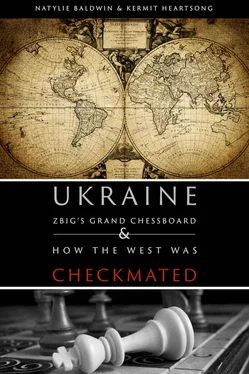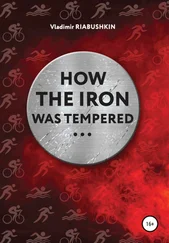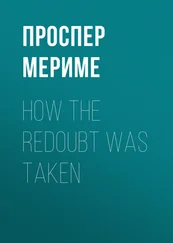Kermit Heartsong - Ukraine - ZBIG's Grand Chess Board & How The West Was Checkmated
Здесь есть возможность читать онлайн «Kermit Heartsong - Ukraine - ZBIG's Grand Chess Board & How The West Was Checkmated» весь текст электронной книги совершенно бесплатно (целиком полную версию без сокращений). В некоторых случаях можно слушать аудио, скачать через торрент в формате fb2 и присутствует краткое содержание. Год выпуска: 2015, Жанр: Политика, на английском языке. Описание произведения, (предисловие) а так же отзывы посетителей доступны на портале библиотеки ЛибКат.
- Название:Ukraine: ZBIG's Grand Chess Board & How The West Was Checkmated
- Автор:
- Жанр:
- Год:2015
- ISBN:нет данных
- Рейтинг книги:4 / 5. Голосов: 1
-
Избранное:Добавить в избранное
- Отзывы:
-
Ваша оценка:
- 80
- 1
- 2
- 3
- 4
- 5
Ukraine: ZBIG's Grand Chess Board & How The West Was Checkmated: краткое содержание, описание и аннотация
Предлагаем к чтению аннотацию, описание, краткое содержание или предисловие (зависит от того, что написал сам автор книги «Ukraine: ZBIG's Grand Chess Board & How The West Was Checkmated»). Если вы не нашли необходимую информацию о книге — напишите в комментариях, мы постараемся отыскать её.
Ukraine: ZBIG's Grand Chess Board & How The West Was Checkmated — читать онлайн бесплатно полную книгу (весь текст) целиком
Ниже представлен текст книги, разбитый по страницам. Система сохранения места последней прочитанной страницы, позволяет с удобством читать онлайн бесплатно книгу «Ukraine: ZBIG's Grand Chess Board & How The West Was Checkmated», без необходимости каждый раз заново искать на чём Вы остановились. Поставьте закладку, и сможете в любой момент перейти на страницу, на которой закончили чтение.
Интервал:
Закладка:
On June 16, 2014, while participating on a panel at the Wilson Center, Brzeziński continued flogging his theme of Russian imperialism, citing an obscure report by a Russian think tank and pushing the narrative that Russia violated Ukraine’s sovereignty and Western actions in Ukraine are reactive and benign:
What we are seeing in Ukraine, in my judgment, is not a pique but a symptom of a more basic problem; namely, the gradual but steady emergence in Russia over the last 6 or 7 years of a quasi-mythical chauvinism…It follows from what I’m saying that the Ukrainian problem is a challenge that the West must address on three levels. We have to effectively deter the temptation facing the Russian leadership regarding the use of force.
We have to, secondly, obtain the termination of Russia’s deliberate efforts at the destabilization of parts of Ukraine. It’s very hard to judge how ambitious these goals are, but it is not an accident that in that one single portion of Ukraine in which the Russians actually predominate, the use of force has been sophisticated. The participants in the effort have been well armed, even with tanks, and certainly with effective anti-aircraft weaponry. All of that is something that even disagreeable, disaffected citizens of a country to which they feel they do not belong would not be storing somewhere in their attic or their basement. These are weapons provided, in effect, for the purpose of shaping formations capable of sustaining serious military engagements. It is a form of interstate aggression. You can’t call it anything else. How would we feel if all of a sudden, let’s say, the drug-oriented gangs in the United States were armed from abroad, from our southern neighbor, by equipment which would promote violence on that scale on a continuing basis? So this is a serious challenge. So that is the second objective.
And the third objective is to promote and then discuss with the Russians a formula for an eventual compromise, assuming that in the first instance the use of force openly and on a large scale is deterred and the effort to destabilize is abandoned. (Brzeziński June 2014)
Not once does Brzeziński acknowledge the Western role played in the events that led to the ouster of a democratically elected president in February, or the role played by neo-Nazi groups like Svoboda and Right Sector in the violence that took control of the Maidan protests and facilitated the coup. Victoria Nuland and John McCain’s egging on the protestors, regardless of their dubious affiliations, is never mentioned. The intercepted phone call between US Undersecretary of Eurasian Affairs Victoria Nuland and American Ambassador Geoffrey Pyatt in which they discuss the US’s favored candidate to replace Ukrainian President Viktor Yanukovych — the candidate that did subsequently replace him — is never acknowledged (Nuland and Pyatt 2014). Nor is the intercepted conversation between Estonian Foreign Minister Urmas Paet and EU High Representative Catherine Ashton acknowledged wherein it is admitted that, according to eyewitness and forensic medical evidence, it appears that elements from the Maidan-controlled buildings were responsible for fatally shooting protestors and police officers, not Yanukovych’s forces (Paet and Ashton 2014). This is all despite the fact that the aforementioned information was readily available to anyone with an internet connection at the time of Brzeziński’s speech.
Moreover, whatever military assistance being provided by Russia to the rebels in Eastern Ukraine at that time — which would be in reaction to Western-fomented instability on their border, not due to some unprovoked imperialistic aggression — was a matter of conjecture and had not been proven with any concrete and verified evidence. Much of the military hardware that Brzeziński refers to was available either from Ukrainian military depots that the rebels had access to or gained control of, Ukrainian soldiers who switched sides in the early stages of the conflict, or in later stages, Ukrainian soldiers that deserted and left behind their hardware (Luhn 2014; TASS 2014).
Furthermore, as University of Rhode Island Professor of Politics Nicolai Petro, who just returned from a year spent in Ukraine, pointed out in a September 3, 2014 article in the National Interest , there are several credible reports that the numerous pronouncements in the summer of 2014 of Russian troops and heavy weapons crossing into Ukraine were false:
This version of official Russian complicity has been challenged by some Western reporters on the scene, most notably, Mark Franchetti who wrote a remarkable piece for the London Sunday Times after spending several weeks embedded with rebel forces. His assessment is backed by the UN High Commissioner for Human Rights and the [Organization for Security and Cooperation in Europe] OSCE observer mission that has been deployed to the border region since the end of July. Both say they have seen no evidence of weapons or military personnel crossing from Russia into Ukraine during this time, even as US and NATO officials say the exact opposite. Moreover, between April and July of 2014, as Russian Ministry of Defense likes to point out, eighteen international inspection teams visited the border region and found “no evidence of undeclared military activity.”(Petro 2014)
Brzeziński's false framing of events, which has been consistently echoed by the White House and the State Department, also suggests that the rebellion in the southeastern parts of Ukraine, which consider themselves to be ethnically, culturally or linguistically Russian, has no indigenous support but is instead contrived through Russian interference. However, Petro cited the results of sociological surveys taken in Ukraine in April, May and June of 2014 that contradict this:
Three-quarters of the populations in Ukraine's eastern cities regard the Euromaidan protests as illegal. Specifically, two-thirds of Donbas residents consider the Maidan to have been “an armed overthrow of the government, organized by the opposition, with the assistance of the West.” A similar percentage believes that the Right Sector is “a prominent military formation that is politically influential and poses a threat to the citizens and national unity.” That may explain why most people in the eastern and southern regions of Ukraine (62 percent) blame the loss of Crimea on Kiev, rather than on Crimean separatists (24 percent), or on Russia (19 percent).
Majorities in Donbas (60 percent in Donetsk and 52 percent in Luhansk) disagree with the view that Russia is organizing the rebels and guiding their actions. Moreover, if a referendum were held today (April 2014), only 25 percent would want to join EU, compared to 47 percent wanting to join the Eurasian Customs Union. (Petro 2014)
During testimony before the Senate Foreign Relations Committee on July 7, Brzeziński continues on with his previous misrepresentation of the events in Ukraine:
“[Russia must] accommodate with Ukraine by terminating the assault on Ukrainian sovereignty and economic well-being…. At the same time, it would be made clear that Russia no longer expects Ukraine to become part of the “Eurasian Union”, a designation which is a transparent cover for the recreation of something approximating the former Soviet Union or the Tsarist Empire….Putin’s second choice is to continue the effort to destabilize Ukraine by sponsoring thinly veiled military intervention designed to disrupt normal life in portions of Ukraine….In brief, the obvious choice for everyone concerned is to find a formula for international accommodation, and that has to involve the abandonment of the use of force against Ukraine by Russia.” (Brzeziński 2014)
In addition to repeating the false narrative already begun in previous articles and interviews, Brzeziński now adds in the implicit accusation of Russia attempting to force Ukraine to become a member of the Eurasian Union, which is mischaracterized as some nefarious imperial project. In reality, the Eurasian Economic Union (aka the Eurasian Union) is a voluntary common market, similar to the EU, currently comprised of Russia, Belarus, Kazakhstan and Armenia (with Kyrgyzstan set to join in 2015). Brzeziński provides no explanation as to why Ukrainians would not have the right to decide for themselves whether to join such an economic union as he makes explicit they have the right to do in connection with the EU. Nor has Brzeziński ever characterized the EU as some Western European neo-imperialist project.
Читать дальшеИнтервал:
Закладка:
Похожие книги на «Ukraine: ZBIG's Grand Chess Board & How The West Was Checkmated»
Представляем Вашему вниманию похожие книги на «Ukraine: ZBIG's Grand Chess Board & How The West Was Checkmated» списком для выбора. Мы отобрали схожую по названию и смыслу литературу в надежде предоставить читателям больше вариантов отыскать новые, интересные, ещё непрочитанные произведения.
Обсуждение, отзывы о книге «Ukraine: ZBIG's Grand Chess Board & How The West Was Checkmated» и просто собственные мнения читателей. Оставьте ваши комментарии, напишите, что Вы думаете о произведении, его смысле или главных героях. Укажите что конкретно понравилось, а что нет, и почему Вы так считаете.











